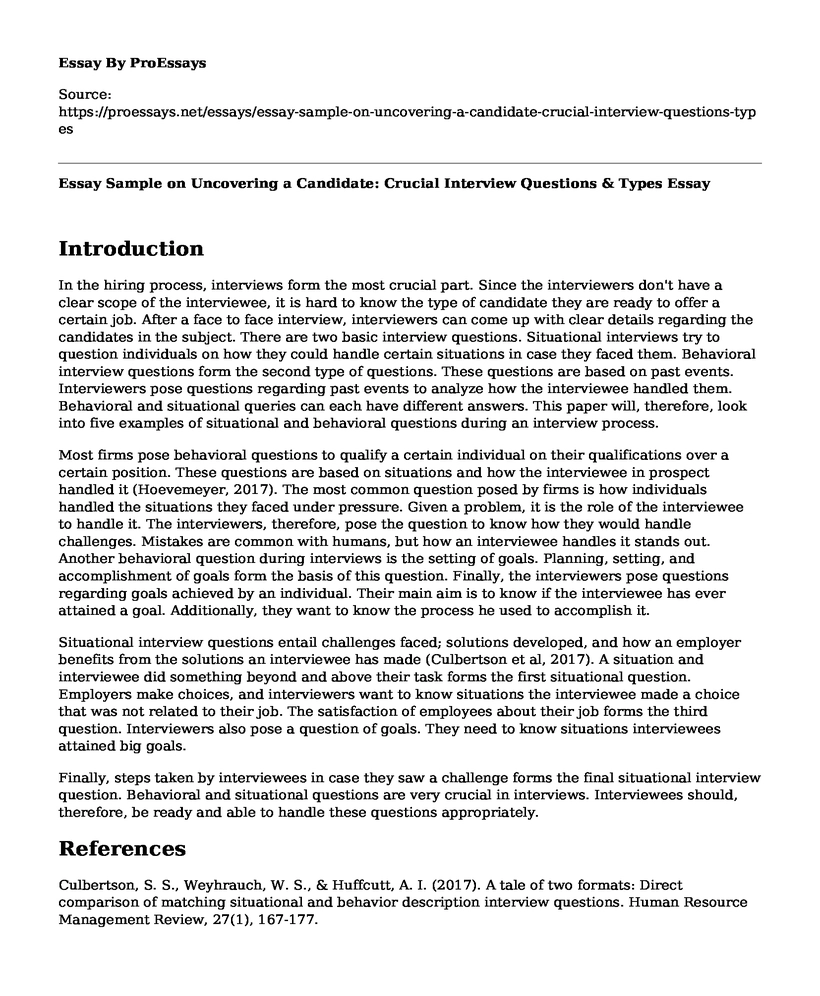Introduction
In the hiring process, interviews form the most crucial part. Since the interviewers don't have a clear scope of the interviewee, it is hard to know the type of candidate they are ready to offer a certain job. After a face to face interview, interviewers can come up with clear details regarding the candidates in the subject. There are two basic interview questions. Situational interviews try to question individuals on how they could handle certain situations in case they faced them. Behavioral interview questions form the second type of questions. These questions are based on past events. Interviewers pose questions regarding past events to analyze how the interviewee handled them. Behavioral and situational queries can each have different answers. This paper will, therefore, look into five examples of situational and behavioral questions during an interview process.
Most firms pose behavioral questions to qualify a certain individual on their qualifications over a certain position. These questions are based on situations and how the interviewee in prospect handled it (Hoevemeyer, 2017). The most common question posed by firms is how individuals handled the situations they faced under pressure. Given a problem, it is the role of the interviewee to handle it. The interviewers, therefore, pose the question to know how they would handle challenges. Mistakes are common with humans, but how an interviewee handles it stands out. Another behavioral question during interviews is the setting of goals. Planning, setting, and accomplishment of goals form the basis of this question. Finally, the interviewers pose questions regarding goals achieved by an individual. Their main aim is to know if the interviewee has ever attained a goal. Additionally, they want to know the process he used to accomplish it.
Situational interview questions entail challenges faced; solutions developed, and how an employer benefits from the solutions an interviewee has made (Culbertson et al, 2017). A situation and interviewee did something beyond and above their task forms the first situational question. Employers make choices, and interviewers want to know situations the interviewee made a choice that was not related to their job. The satisfaction of employees about their job forms the third question. Interviewers also pose a question of goals. They need to know situations interviewees attained big goals.
Finally, steps taken by interviewees in case they saw a challenge forms the final situational interview question. Behavioral and situational questions are very crucial in interviews. Interviewees should, therefore, be ready and able to handle these questions appropriately.
References
Culbertson, S. S., Weyhrauch, W. S., & Huffcutt, A. I. (2017). A tale of two formats: Direct comparison of matching situational and behavior description interview questions. Human Resource Management Review, 27(1), 167-177.
Hoevemeyer, V. (2017). High-impact interview questions: 701 behavior-based questions to find the right person for every job. Amacom.
Cite this page
Essay Sample on Uncovering a Candidate: Crucial Interview Questions & Types. (2023, Jan 30). Retrieved from https://proessays.net/essays/essay-sample-on-uncovering-a-candidate-crucial-interview-questions-types
If you are the original author of this essay and no longer wish to have it published on the ProEssays website, please click below to request its removal:
- Wal-Mart: Strategic Sourcing and Outsourcing. E-Procurement.
- Analysis of Ability to Deal with Work Demands - Paper Example
- Employee Performance Appraisal Essay
- Personal Statement for Transfer Admissions for the Accounting Course
- Essay Example on Hiring Financial Manager: Job Specs, Compensations & Benefits
- Night Shift Working: Key to Economic Growth? - Essay Sample
- Essay Example on Mr. Barry Porter: 5 Years as SFAFP's Marketing Coordinator







